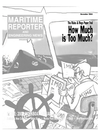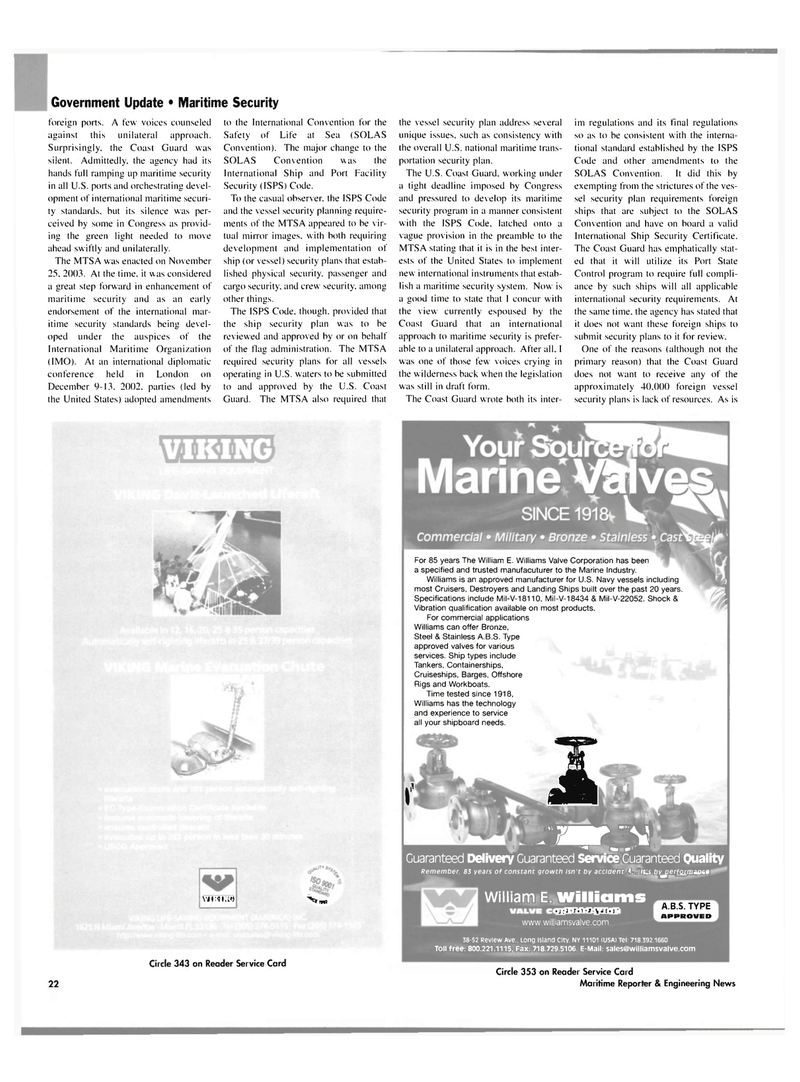
Page 22: of Maritime Reporter Magazine (November 2003)
Read this page in Pdf, Flash or Html5 edition of November 2003 Maritime Reporter Magazine
Government Update • Maritime Security foreign ports. A few voices counseled against this unilateral approach.
Surprisingly, the Coast Guard was silent. Admittedly, the agency had its hands full ramping up maritime security in all U.S. ports and orchestrating devel- opment of international maritime securi- ty standards, but its silence was per- ceived by some in Congress as provid- ing the green light needed to move ahead swiftly and unilaterally.
The MTSA was enacted on November 25. 2003. At the time, it was considered a great step forward in enhancement of maritime security and as an early endorsement of the international mar- itime security standards being devel- oped under the auspices of the
International Maritime Organization (IMO). At an international diplomatic conference held in London on
December 9-13. 2002. parties (led by the United States) adopted amendments to the International Convention for the
Safety of Life at Sea (SOLAS
Convention). The major change to the
SOLAS Convention was the
International Ship and Port Facility
Security (ISPS) Code.
To the casual observer, the ISPS Code and the vessel security planning require- ments of the MTSA appeared to be vir- tual mirror images, with both requiring development and implementation of ship (or vessel) security plans that estab- lished physical security, passenger and cargo security, and crew security, among other things.
The ISPS Code, though, provided that the ship security plan was to be reviewed and approved by or on behalf of the flag administration. The MTSA required security plans for all vessels operating in U.S. waters to be submitted to and approved by the U.S. Coast
Guard. The MTSA also required that the vessel security plan address several unique issues, such as consistency with the overall U.S. national maritime trans- portation security plan.
The U.S. Coast Guard, working under a tight deadline imposed by Congress and pressured to develop its maritime security program in a manner consistent with the ISPS Code, latched onto a vague provision in the preamble to the
MTSA stating that it is in the best inter- ests of the United States to implement new international instruments that estab- lish a maritime security system. Now is a good time to state that I concur with the view currently espoused by the
Coast Guard that an international approach to maritime security is prefer- able to a unilateral approach. After all. I was one of those few voices crying in the wilderness back when the legislation was still in draft form.
The Coast Guard wrote both its inter- im regulations and its final regulations so as to be consistent with the interna- tional standard established by the ISPS
Code and other amendments to the
SOLAS Convention. It did this by exempting from the strictures of the ves- sel security plan requirements foreign ships that are subject to the SOLAS
Convention and have on board a valid
International Ship Security Certificate.
The Coast Guard has emphatically stat- ed that it will utilize its Port State
Control program to require full compli- ance by such ships will all applicable international security requirements. At the same time, the agency has stated that it does not want these foreign ships to submit security plans to it for review.
One of the reasons (although not the primary reason) that the Coast Guard does not want to receive any of the approximately 40.000 foreign vessel security plans is lack of resources. As is :
ViHKM ^flWJ
Circle 343 on Reader Service Card
For 85 years The William E. Williams Valve Corporation has been a specified and trusted manufacturer to the Marine Industry.
Williams is an approved manufacturer for U.S. Navy vessels including most Cruisers, Destroyers and Landing Ships built over the past 20 years.
Specifications include Mil-V-18110, Mil-V-18434 & Mil-V-22052. Shock &
Vibration qualification available on most products.
For commercial applications
Williams can offer Bronze,
Steel & Stainless A.B.S. Type approved valves for various services. Ship types include
Tankers, Containerships,
Cruiseships, Barges, Offshore
Rigs and Workboats.
Time tested since 1918,
Williams has the technology and experience to service all your shipboard needs.
I' 7 - > Guaranteed Delivery Guaranteed Service Guaranteed Quality
Remember. 83 years of constant growth isn't by accident A. . Itls byjjerfsjmajice
William E. Williams • j;2 -I*1-7•\J [• ] ' www.williamsvalve.com
A.B.S. TYPE
APPROVED 22 38-52 Review Ave., Long island City. NY 11101 (USA) Tel: 718.392.1660
Toll free: 800.221.1115, Fax: 718.729.5106. E-Mail: [email protected]
Circle 353 on Reader Service Card
Maritime Reporter & Engineering News

 21
21

 23
23
